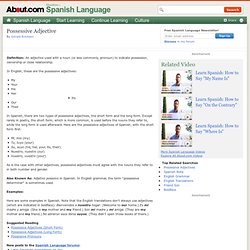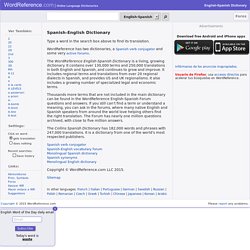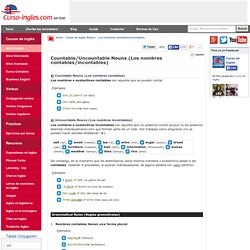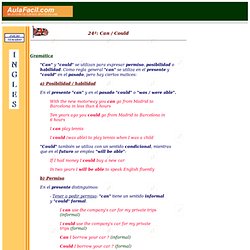

Definition of 'Possessive Adjective' - Grammar Glossary for Spanish and English. Definition: An adjective used with a noun (or less commonly, pronoun) to indicate possession, ownership or close relationship.

In English, these are the possessive adjectives: MyYourHisHerItsOurTheirIn Spanish, there are two types of possessive adjectives, the short form and the long form. Except rarely in poetry, the short form, which is more common, is used before the nouns they refer to, while the long form is used afterward. Here are the possessive adjectives of Spanish, with the short form first:Mi, mío (my)Tu, tuyo (your)Su, suyo (his, her, your, its, their)Nuestro, nuestro (our)Vuestro, vuestro (your)As is the case with other adjectives, possessive adjectives must agree with the nouns they refer to in both number and gender. Also Known As: Adjetivo posesivo in Spanish. Examples: Here are some examples in Spanish.
English-Spanish Dictionary. Spanish-English Dictionary Type a word in the search box above to find its translation.

WordReference has two dictionaries, a Spanish verb conjugator and some very active forums. The WordReference English-Spanish Dictionary is a living, growing dictionary. It contains over 130,000 terms and 250,000 translations in both English and Spanish, and continues to grow and improve. It includes regional terms and translations from over 20 regional dialects in Spanish, and provides US and UK regionalisms.
Thousands more terms that are not included in the main dictionary can be found in the WordReference English-Spanish Forum questions and answers. The Collins Spanish Dictionary has 182,000 words and phrases with 247,000 translations. Spanish verb conjugatorSpanish-English vocabulary forumMonolingual Spanish dictionarySpanish synonymsMonolingual English dictionary Copyright © WordReference.com LLC 2015. Sitemap. Give - English-Spanish Dictionary. English - Spanish online translator, dictionary.
English Vocabulary - Vocabulario de inglés - Which one? - Commonly confused words. Passive voice explicacion en español. PAST PERFECT. Countable/Uncountable Nouns - Lección de Inglés: Los nombres contables/incontables- Countable Nouns (Los nombres contables) Los nombres o sustantivos contables son aquellos que se pueden contar.

Ejemplos:one pencil, a pencilPlayone [a] pencil (un lápiz)two catsPlaytwo cats (dos gatos)three housesPlaythree houses (tres casas) Uncountable Nouns (Los nombres incontables) Los nombres o sustantivos incontables son aquellos que no podemos contar porque no los podemos delimitar individualmente sino que forman parte de un todo. Son tratados como singulares (no se pueden hacer plurales añadiendo '-s'). salt(sal), wood Play wood(madera), tea Play tea(té), wine Play wine(vino), sugar Play sugar(azúcar), bread Play bread(pan), furniture. Conjugate Spanish Verbs with SpanishDict's Verb Conjugator.
Ayuda gramática inglesa: verbos modales - should, must, ought to. La gramática inglesa: explicaciones y ejercicios...

Ejercicios de la gramática inglesa Buscar ayuda en nuestro foro Buscar términos gramaticales específicos en English Spanish Link... Modals - Lección de Inglés: Modales- Los verbos modales son verbos auxiliares que no pueden funcionar como un verbo principal, a diferencia de los verbos auxiliares "be", "do" y "have" que sí pueden funcionar como un verbo principal.

Los verbos modales expresan modalidad. Pueden expresar habilidad, posibilidad, necesidad u otra condición. Son verbos auxiliares del futuro y del condicional. Los tiempos verbales ingleses no son suficientes para expresar ideas de posibilidad o incertidumbre. No existe un tiempo verbal del condicional en inglés. Como verbos complementarios que son, los verbos modales no funcionan sin otro verbo. Los verbos modales son: canPlaycancouldPlaycouldmayPlaymaymightPlaymightwillPlaywillshallPlayshallshouldPlayshouldought toPlayought tomustPlaymustwouldPlaywould Can "Can" indica habilidad o posibilidad. Ejemplos:I can speak five languages.PlayI can speak five languages. En frases interrogativas, el uso de "can" puede solicitar permiso o preguntar sobre posibilidades. Ejemplos:Can I have a glass of water? English dictionary & thesaurus, translation from English to Spanish & Turkish and Spanish to English - Cambridge Dictionary Online.
Diccionarios de Español, Ingles, Francés, Portugues. Forums. Babbel. ENTENDIENDO INGLES. Inglés. "Can" y "could" se utilizan para expresar permiso, posibilidad o habilidad.

Como regla general "can" se utiliza en el presente y "could" en el pasado, pero hay ciertos matices:a) Posibilidad / habilidadEn el presente "can" y en el pasado "could" o "was / were able". With the new motorway you can go from Madrid to Barcelona in less than 4 hoursTen years ago you could go from Madrid to Barcelona in 6 hoursI can play tennisI could (was able) to play tennis when I was a child "Could" también se utiliza con un sentido condicional, mientras que en el futuro se emplea "will be able": If I had money I could buy a new carIn two years I will be able to speak English fluently b) PermisoEn el presente distinguimos: - Tener o pedir permiso: "can" tiene un sentido informal y "could" formal.
I can use the company's car for my private trips (informal)I could use the company's car for my private trips (formal)Can I borrow your car ? Inglés. Ingles para hispanohablantes - Recursos para aprender ingles en linea. Ejercicio inglés: Pronouns (Pronombres) English Vocabulary with pronunciation and translation. Site that explain English grammar in Spanish.